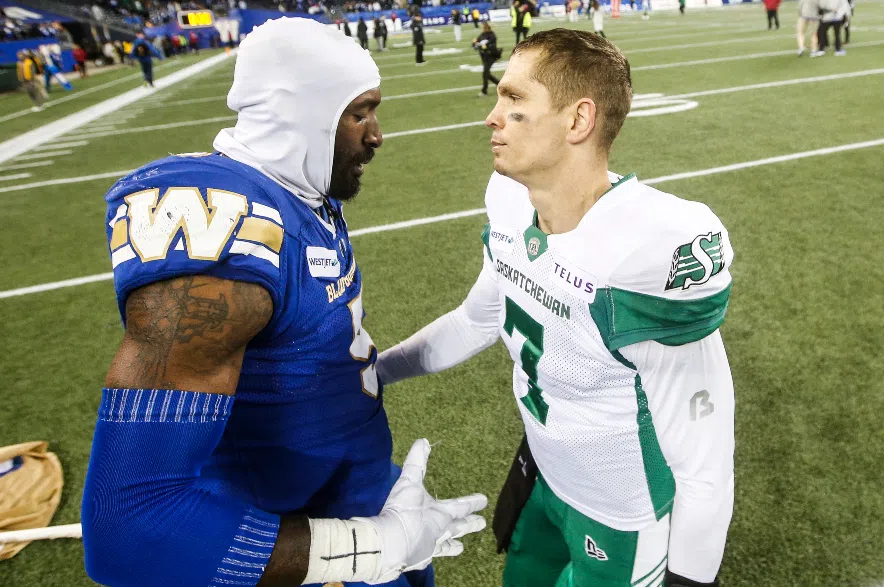ST. JOHN’S, N.L. — A queer artist from western Newfoundland is facing off against homophobia and hyper-masculinity in sports by creating a make-believe hockey league full of “sissies,” “pansies” and “flamers.”
Lucas Morneau spent much of the COVID-19 pandemic hunched over his hands, crocheting and rug hooking 14 jerseys for teams such as the St. John’s Sissies, the Come By Chance Flamers, the Pasadena Pansies and the Bonavista Buggers. They’re all part of his imaginary Queer Newfoundland Hockey League, which is the name he’s given to the collection of work.
“It’s been something that was brewing in the back of my head for about two years,” Morneau said in a recent interview. “I wanted to work with rug hooking in some sort of way … and I wanted to do something that dealt with queer theory a bit or reclaimed pejoratives, but didn’t know really how to.”
Then, he said, “the whole Don Cherry thing” happened.
Like it is for many in Newfoundland and Labrador, hockey is a big deal in the Morneau family. His uncle, George Faulkner, was a professional hockey player and led Canada’s national team to a bronze medal in the 1966 World Hockey Championships in the former Yugoslavia. He’s now a member of the provincial Hockey Hall of Fame.
His childhood nights were often spent watching Hockey Night in Canada and its well-known segment Coach’s Corner, which was co-hosted by Don Cherry, Morneau said. When Cherry was let go in 2019 following on-air comments many felt were critical of immigrants for not wearing Remembrance Day poppies, Morneau said he started reflecting on those nights watching Cherry.
“Some of the past things that he said, specifically about European players and players that refused to fight, and him using pejoratives like ‘sissy’ and ‘pansy,’ and really looking a the homophobic root of that,” he said. “After that, I came up with the idea of the hockey jerseys.” The Canadian Press was unable to reach Cherry for comment on Monday.
The project is also a way to critique the past use of racial slurs in masculine professional sports, he said, pointing to the former name of the Canadian Football League’s Edmonton Elks, which had a name considered a slur to Indigenous Peoples. Major League Baseball’s Cleveland Indians have announced they would be called the “Guardians” for the 2022 season, following years of criticism from Indigenous groups and fans.
Morneau applied for a grant in February 2020 for the project, and it came through just as the COVID-19 pandemic hit, he said.
He used rug hooking, sometimes with materials like pantyhose, to make the emblems for the front of the jerseys and then crocheted the shirts. Morneau used the more comedic Newfoundland town names for some teams, like the Dildo Dykes, but he also made use of real symbols for other towns. The logo for the Come By Chance Flamers, for example, represents a huge flame bursting from a pipe in the town’s massive oil refinery.
The design for his Corner Brook Queens jersey borrows from the colours, patterns and logo used by the Corner Brook Royals, the team his uncle played for.
Morneau has also created series of fake hockey cards for his fantasy teams, featuring players with tinted aviator shades, greasy handlebar moustaches and classic mullet-style haircuts. The card for the Port Union Pinkos shows a bald man in a full face of makeup wearing his pink and yellow crocheted jersey and making a suggestive tongue motion at the camera.
His hockey-loving family has been completely on board with the project, he said. His father, he added, pushed him toward some of the funnier town names, like the Leading Tickles Lesbos. “I would have the pejoratives ready, but I had a hard time sometimes trying to pick a town,” he said. “I have more town names I would love to make jerseys for … like Spread Eagle!”
Morneau has posted pictures of the jerseys and the hockey cards to his Instagram account. Earlier this summer, The Rooms, Newfoundland and Labrador’s provincial art gallery, purchased his St. John’s Sissies jersey for its permanent collection.
The work will also be shown in October in Moncton, N.B., at La Galerie Sans Nom, he said, adding that more shows will likely be added as the COVID-19 pandemic abates.
This report by The Canadian Press was first published Aug. 16, 2021.
Sarah Smellie, The Canadian Press







